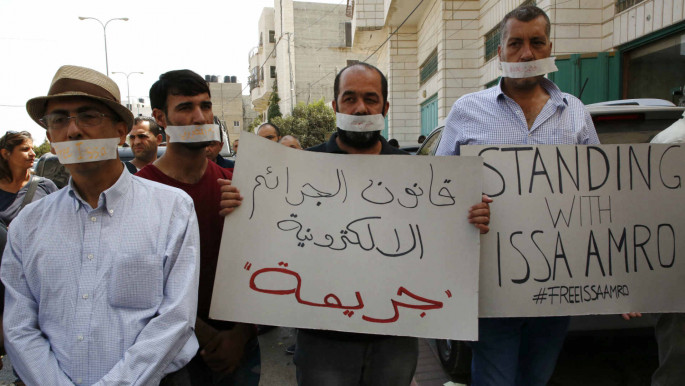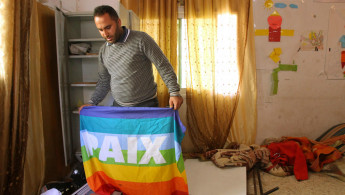Issa Amro and Palestine's struggle for freedom of speech
Palestinian and international supporters had staged a small demonstration while waiting for the well-known human rights activist to appear in front of a judge, facing charges for criticising the Palestinian Authority in a Facebook post. They held placards that read "Issa Amro, the voice of the truth", and "electronic law is a crime".
Amro had been in PA custody since September 4, when he'd turned himself in to the Palestinian security forces after being summoned for interrogation. In the incriminating post, he had criticised the PA for arresting Ayman Qawasmeh, a local radio journalist whose station had been shut down in an Israeli army raid a few days earlier.
Qawasmeh, who was relased after three days, had himself called for the Palestinian leadership to resign for allowing the raid to take place.
 |
It's an intimidation message for all other Palestinian human rights defenders |  |
Amro faced charges of disturbing "public order" under article 20 of the recently-passed Electronic Crimes Law, as well as "causing strife" and "insulting the higher authorities" under the 1960 Jordanian Penal code, which is still enforced in the West Bank. He was ordered to pay $1,400 in bail, but the charges against him still stand.
Several human rights groups including Amnesty International have called for the Electronic Crime Law, passed by presidential decree last July, to be repealed.
They say the law is too broad and open to interpretation, allowing for the arrest of anyone who criticises the authorities online, including journalists and whistleblowers, and the imposition of heavy fines. It also provides for imprisonment and up to 15 years of hard labour.
Amro, who co-founded the Hebron-based anti-occupation group Youth Against Settlements, is recognised by the EU as a human rights defender and is well-known as an advocate of non-violent resistance. Israel is currently prosecuting him on 18 counts, all related to his activism. He is due to appear in front of an Israeli military court later this month.
Amro's case is the latest symptom of the shrinking space for dissent in the West Bank, where Israeli military orders criminalise protest and consider Palestinian political parties "illegal organisations" - resulting in jail sentences even for members of the Palestinian Legislative Council such as Khalida Jarrar, affiliated with the leftist PFLP.
The PA progressively stepped up its own campaign against dissent in the West Bank in recent months, as documented in a recent report by Amnesty International, which also slammed the Hamas authorities in Gaza for grave violations against journalists and activists.
 |
|
| A protest in support of Issa Amro in the West Bank [AFP] |
Last June, the PA blocked 29 websites, mostly affiliated with political opposition groups.
The PA has since come under increasing criticism for its security coordination with Israel and recent policies over Gaza. Several decisions of the Ramallah leadership, aimed at building pressure on the Hamas administration in Gaza, have worsened the already dire humanitarian and economic conditions in the Strip.
Most notably, a PA decision to cut payments to the Israeli electricity company for power it provides to Gaza has brought the Strip's infrastructure and healthcare system to the point of collapse.
It has also ushered in the return to the Palestinian political scene of President Mahmoud Abbas' long-term political rival, Mohammed Dahlan, a former Fatah leader in Gaza who lives in exile.
Latest tool to crush dissent
Amnesty International expressed concern that the Electronic Crimes Law is being used "as a tool to silence dissenting voices and opposition in the ongoing political conflict between the administrations of the West Bank and Gaza".
In at least six recent cases, the watchdog said, the detention of journalists was used as a "bargaining chip" in the row between the Fatah-dominated PA and Hamas.
Ahmad Alhalaiqa, a journalist for the Hamas-affiliated al-Quds channel in Hebron, was arrested last July on suspicion of "leaking sensitive information to hostile authorities", according to statements released by state news agency Wafa. Four other journalists were arrested on the same day.
According to prisoners' group Addameer, the five - who were held for five days - were accused of violations of article six of the Electronic Crime Law, despite initial claims their arrest had nothing to do with the decree.
Ahhaiqa told The New Arab he was arrested from his home at midnight. After a short investigation focused on his work with al-Quds TV, he was brought before the public prosecution, where it was decided he should be released.
"However, as I was on my way to prison to sign papers for my release, they stopped me and brought me back to the prosecution, where my arrest was extended for another 24 hours for further questioning," he said, adding that he believes it was a "political decision".
Twitter Post
|
A judge then agreed to extend his detention for a further ten days. However, Alhaiqa was eventually released before that time had passed. According to Addameer, the PA security forces admitted that the arrests were aimed at pressuring Hamas to release a journalist detained in Gaza.
While the PA has in the past detained political opponents and is known to share information with the Israeli authorities as part of its much-criticised security coordination with Tel Aviv, observers believe the scope of the latest crackdown to be much wider.
"Obviously there are the internal divisions with Hamas, with Dahlan, as the PA sees them as its main opponents," Nadim Nashif, director of 7amleh, the Arab Centre for the Advancement of Social Media, told The New Arab.
Read more: Palestine's new electronic crime law 'big setback to freedom of expression'
"But with these arrests, and blocking of websites, we see that it's much beyond that. Issa Amro is neither Dahlan nor Hamas.
"Some of the websites that have been blocked are not really either of these. The same goes for other people who have been arrested or interrogated or silenced because of their critical approach. The owner of the radio station, Qawasmeh, comes from the PA itself," he added.
 |
I am one of the most well-known human rights defenders, and I write openly without any kind of fear |  |
Later in the afternoon, Amro's friends and colleagues welcomed him back at the Youth Against Settlement centre in Tel Rumeida, an old Palestinian house surrounded by olive trees, which used to serve as an Israeli military base thanks to its position on a hill overlooking the city. It's located in Hebron's H2 area, the 20 percent of the city under Israeli control, where Palestinians and Israeli settlers live under a regime of segregation.
Amro gave a small press conference and thanked international supporters via social media for helping secure his release, vowing to continue with his work.
He was in no doubt as to the reason for his detention. "I am one of the most well-known human rights defenders, and I write openly without any kind of fear," he told the New Arab. "It's an intimidation message for all other Palestinian human rights defenders."
Follow her on Twitter: @YleniaGostoli



